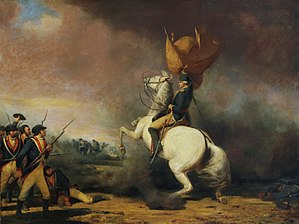Battle of Princeton
| Battle of Princeton | |||||||
|---|---|---|---|---|---|---|---|
| Part of the American Revolutionary War | |||||||
 A painting of George Washington rallying his troops at the Battle of Princeton |
|||||||
|
|||||||
| Belligerents | |||||||
|
|
|
||||||
| Commanders and leaders | |||||||
|
|
|
||||||
| Strength | |||||||
| 4,500 35 guns |
1,200 6–9 guns |
||||||
| Casualties and losses | |||||||
| 25–44 killed 40 wounded |
18–100 killed 58–70 wounded 194–280 captured |
||||||
The Battle of Princeton (January 3, 1777) was a pivotal battle in the American Revolutionary War in which the Continental Army, commanded by General George Washington, defeated British forces near Princeton, New Jersey.
After the victory over the Hessians at the Battle of Trenton on the morning of December 26, 1776, Washington withdrew back to Pennsylvania. He subsequently decided to attack the British forces before going into winter quarters. On December 29, he led his army back into Trenton. On the night of January 2, 1777, Washington repulsed a British attack at the Battle of the Assunpink Creek. That night, he evacuated his position, circled around General Lord Cornwallis' army, and went to attack the British garrison at Princeton.
On January 3, Brigadier General Hugh Mercer of the Continental Army clashed with two regiments under the command of Lieutenant Colonel Charles Mawhood of the British Army. Mercer and his troops were overrun, and Mercer was mortally wounded. Washington sent some militia under Brigadier General John Cadwalader to help them. The militia, on seeing the flight of Mercer's men, also began to flee. Washington rode up with reinforcements and rallied the fleeing militia. He then led the attack on Mawhood's troops, driving them back. Mawhood gave the order to retreat and most of the troops tried to flee to Cornwallis in Trenton.
In Princeton itself, Brigadier General John Sullivan encouraged some British troops who had taken refuge in Nassau Hall to surrender, ending the battle. After the battle, Washington moved his army to Morristown, and with their third defeat in 10 days, the British evacuated southern New Jersey. With the victory at Princeton, morale rose in the American ranks and more men began to enlist in the army. The battle (while considered minor by British standards) was the last major action of Washington's winter New Jersey campaign.
...
Wikipedia
